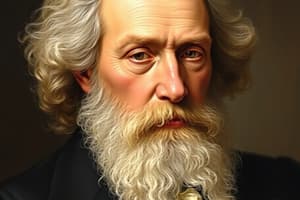Podcast
Questions and Answers
What is modern economic theory?
What is modern economic theory?
- A body of knowledge and understanding of economic systems and processes developed in the 20th century (correct)
- An ancient economic concept based on laissez-faire policies
- A system that emphasizes static equilibrium and classical economics
- A theory advocating for minimal government intervention in the economy
What contributed to the transition from classical economics to modern economic theory?
What contributed to the transition from classical economics to modern economic theory?
- The development of classical economics
- The Great Depression (correct)
- Increased government spending during economic downturns
- The rise of laissez-faire policies
Who developed Keynesian economics?
Who developed Keynesian economics?
- John Maynard Keynes (correct)
- Karl Marx
- Adam Smith
- Milton Friedman
What does Keynesian economics emphasize?
What does Keynesian economics emphasize?
How does Keynesian economics differ from classical economics?
How does Keynesian economics differ from classical economics?
What drove advancements in economic thought during the 20th century?
What drove advancements in economic thought during the 20th century?
What is the key focus of neoclassical economics?
What is the key focus of neoclassical economics?
What is the main criticism of modern economic theory according to the passage?
What is the main criticism of modern economic theory according to the passage?
How does behavioral economics differ from neoclassical economics?
How does behavioral economics differ from neoclassical economics?
What is the role of mathematical economics in modern economic theory?
What is the role of mathematical economics in modern economic theory?
What is the main purpose of econometrics in modern economic theory?
What is the main purpose of econometrics in modern economic theory?
What is the main conclusion of the passage about modern economic theory?
What is the main conclusion of the passage about modern economic theory?
Study Notes
Understanding Modern Economic Theory
Modern economic theory refers to the body of knowledge and understanding of economic systems and processes that developed during the 20th century. This period saw significant advancements in economic thought, driven by a shift away from classical economics towards more complex and nuanced models. Here, we delve into key areas of modern economic theory, providing a comprehensive overview of this dynamic field.
Evolution of Economic Thought
Before diving into specific areas of modern economic theory, it's essential to understand the historical context in which it developed. The 20th century saw a shift from classical economics, with its emphasis on static equilibrium and laissez-faire policies, towards a more nuanced understanding of economic systems and processes. This transition was driven by various factors, including the Great Depression and the rise of Keynesian economics.
Keynesian Economics
Keynesian economics, developed by John Maynard Keynes, is a macroeconomic theory that emphasizes government intervention to stabilize economic fluctuations. It argues that increased government spending during economic downturns can help stimulate demand and increase economic activity. This theory contrasts with classical economics, which advocates for minimal government intervention in the economy.
Neoclassical Economics
Neoclassical economics, also known as marginalism, is a microeconomic theory that emphasizes the rational decision-making of individuals and businesses. It uses the concept of marginal utility to explain how consumers make decisions and the concept of equilibrium to explain how markets operate. This theory has been widely influential in shaping modern economic theory and policy.
Behavioral Economics
Behavioral economics, which emerged in the late 20th century, challenges the traditional assumptions of neoclassical economics by recognizing that individuals do not always make rational decisions. Instead, it focuses on understanding the psychological, social, and environmental factors that influence economic behavior.
Mathematical Economics
Modern economic theory is heavily influenced by mathematical modeling and statistical analysis. Mathematical economics provides a formal language for analyzing economic problems and developing theories, while econometrics uses statistical methods to test the validity of economic theories and predictions.
Criticisms and Controversies
Despite its widespread influence, modern economic theory has faced criticisms and controversies. Critics argue that it tends to ignore historical and political contexts, focusing instead on abstract models that do not accurately reflect the complexities of real-world economies. Additionally, some argue that modern economic theory is used to deceive the public by obscuring the power dynamics inherent in economic systems.
Conclusion
Modern economic theory encompasses a wide range of perspectives and approaches, from Keynesian macroeconomics to neoclassical microeconomics, behavioral economics, and mathematical modeling. While it has been influential in shaping economic policy and understanding, it has also faced criticisms for its abstract nature and potential for deception. As the field continues to evolve, it will undoubtedly face new challenges and controversies, but it remains an essential tool for understanding and navigating the complex world of modern economies.
Studying That Suits You
Use AI to generate personalized quizzes and flashcards to suit your learning preferences.
Description
Test your knowledge of modern economic theory with this quiz that covers key concepts such as Keynesian economics, neoclassical economics, behavioral economics, and mathematical modeling. Explore the evolution of economic thought and the criticisms faced by modern economic theory.




